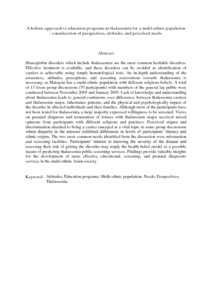Citation
Wong, Li Ping and George, Elizabeth and Tan, Mary Anne Jin Ai
(2011)
A holistic approach to education programs in thalassemia for a multi-ethnic population: consideration of perspectives, attitudes, and perceived needs.
Journal of Community Genetics, 2 (2).
pp. 71-79.
ISSN 1868-310X; ESSN: 1868-6001
Abstract
Hemoglobin disorders which include thalassemias are the most common heritable disorders. Effective treatment is available, and these disorders can be avoided as identification of carriers is achievable using simple hematological tests. An in-depth understanding of the awareness, attitudes, perceptions, and screening reservations towards thalassemia is necessary, as Malaysia has a multi-ethnic population with different religious beliefs. A total of 13 focus group discussions (70 participants) with members of the general lay public were conducted between November 2008 and January 2009. Lack of knowledge and understanding about thalassemia leads to general confusions over differences between thalassemia carriers and thalassemia major, inheritance patterns, and the physical and psychologically impact of the disorder in affected individuals and their families. Although most of the participants have not been tested for thalassemia, a large majority expressed willingness to be screened. Views on prenatal diagnosis and termination of fetuses with thalassemia major received mixed opinions from participants with different religions and practices. Perceived stigma and discrimination attached to being a carrier emerged as a vital topic in some group discussions where disparity in the answers exhibited differences in levels of participants’ literacy and ethnic origins. The two most common needs identified from the discussion were information and screening facilities. Participants’ interest in knowing the severity of the disease and assessing their risk of getting the disorder may imply the health belief model as a possible means of predicting thalassemia public screening services. Findings provide valuable insights for the development of more effective educational, screening, and prenatal diagnostic services in the multi-ethnic Asian society.
Download File
![[img]](http://psasir.upm.edu.my/24525/1.hassmallThumbnailVersion/A%20holistic%20approach%20to%20education%20programs%20in%20thalassemia%20for%20a%20multi.pdf)  Preview |
|
PDF (Abstract)
A holistic approach to education programs in thalassemia for a multi.pdf
Download (148kB)
| Preview
|
|
Additional Metadata
Actions (login required)
 |
View Item |

